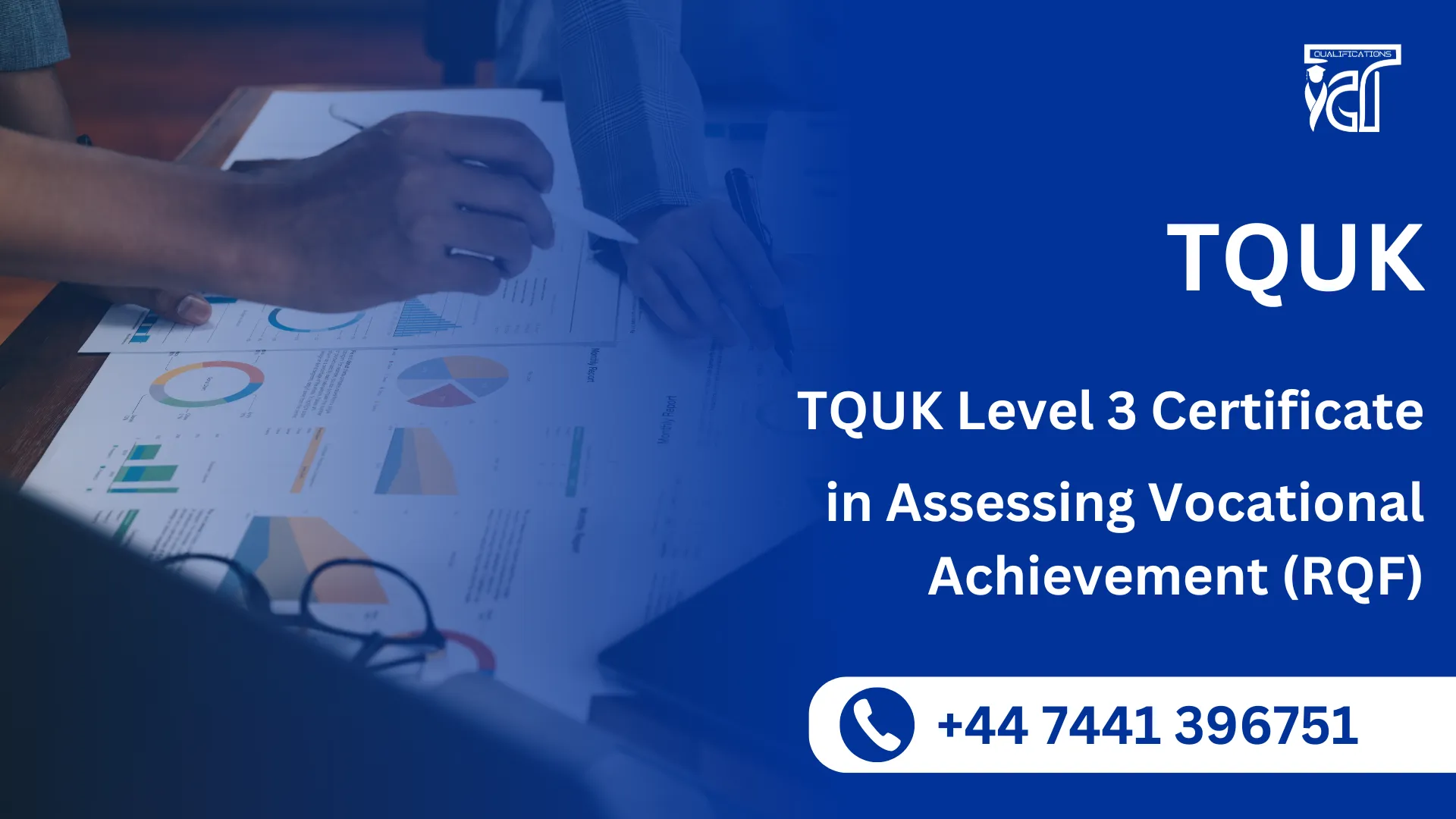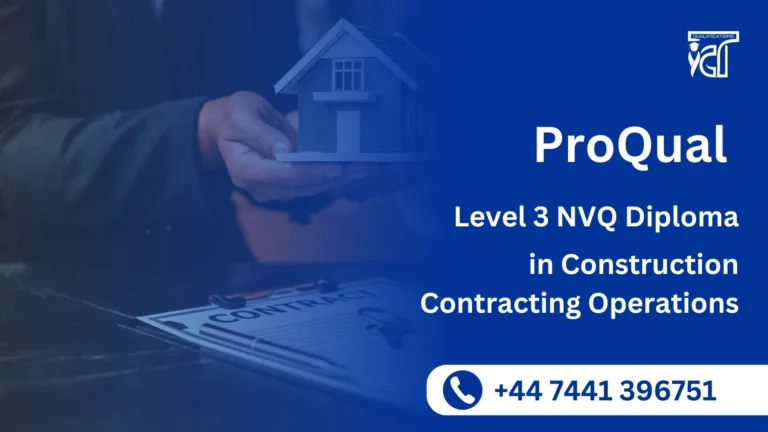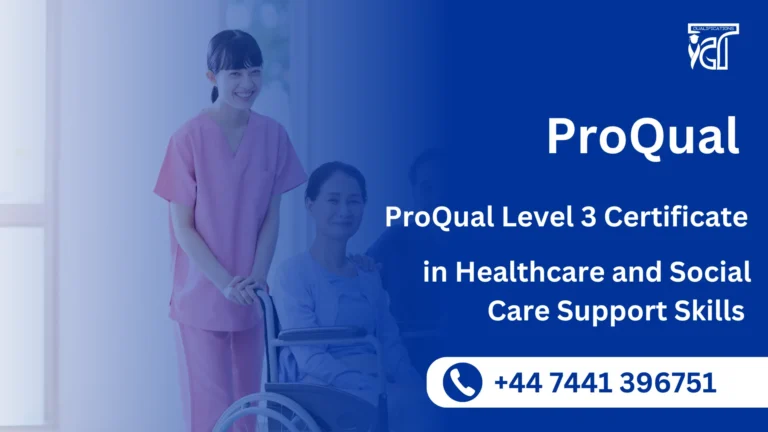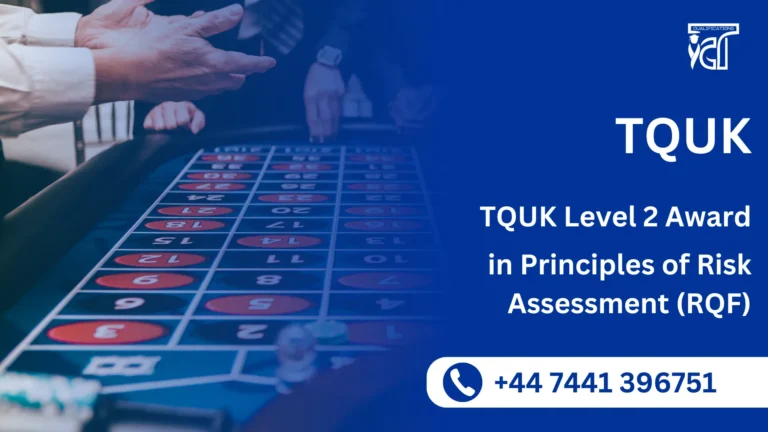The TQUK Level 3 Certificate in Assessing Vocational Achievement (RQF) is an Ofqual-regulated qualification designed for individuals aspiring to become qualified assessors in the vocational education and training sector. Whether you’re looking to assess learners in the workplace or in a learning environment, this course offers the skills and knowledge needed to effectively assess vocational achievement. The qualification is entirely assignment-based, ensuring that you gain practical, real-world experience in assessing vocational competencies.
The TQUK Level 3 Certificate in Assessing Vocational Achievement (RQF) is an essential qualification for individuals looking to pursue a career in assessment within vocational education. This course will equip you with the necessary skills to assess a wide range of vocational qualifications, ensuring learners meet the required standards in their specific fields. Whether you plan to work as an internal or external assessor, the RQF Level 3 Certificate provides the foundations of good assessment practice, ensuring that you are qualified to assess learners in the workplace or classroom.
The TQUK Level 3 Certificate in Assessing Vocational Achievement (RQF) is designed to provide candidates with the understanding and practical experience of assessing learners in vocational settings. It focuses on the assessment of vocational skills, knowledge, and competence.
This qualification provides a clear route into becoming an assessor and is widely recognized across various industries, including education, healthcare, business, and construction. It focuses on the development of skills in the assessment of learners’ practical competencies, ensuring you have the tools and knowledge to assess accurately and professionally.
The TQUK Level 3 Certificate in Assessing Vocational Achievement (RQF) is an excellent qualification for anyone looking to become a qualified assessor within vocational education and training. With Ofqual-regulated status, assignment-based learning, and comprehensive coverage of key assessment principles, this qualification ensures that you develop both the theoretical knowledge and practical skills needed to succeed in the field. Whether you’re an aspiring assessor, a workplace trainer, or a professional looking to formalize your skills, this qualification will give you the expertise to make a meaningful impact in vocational achievement assessment.
TQUK Level 3 Certificate in Assessing Vocational Achievement (RQF)
The TQUK Level 3 Certificate in Assessing Vocational Achievement consists of 3 mandatory unit, 15 credit value, and 84 Guided Learning Hours (GLH) for this qualification.
| Sr# | Unit Title | Credit Hours |
|---|---|---|
| 1 | Assess occupational competence in work environment | 6 |
| 2 | Asses vocational skills, knowledge and understanding | 6 |
| 3 | Understanding the principles and practices of assessment | 3 |
GLH (Guided Learning Hours) and TQT (Total Qualification Time) are terms commonly used in vocational qualifications to help define the amount of time a learner is expected to spend on their studies.
1. GLH (Guided Learning Hours)
GLH refers to the number of hours a learner spends being directly taught, supervised, or supported during their course. This includes the time spent in activities such as:
- Classroom instruction
- Practical workshops
- One-on-one tutoring or mentoring sessions
- Online learning sessions with tutor support
In other words, GLH represents the time that learners are actively engaged with their instructors or learning activities.
2. TQT (Total Qualification Time)
TQT represents the total amount of time a learner is expected to invest in completing a qualification, including:
- GLH (Guided Learning Hours): Time spent on direct learning, as explained above.
- Self-Directed Learning: This includes time spent on independent study, research, assignment completion, preparation for exams, and any other work the learner does outside of direct teaching hours.
TQT is a broader measure that includes all the time required to achieve the qualification. It helps learners and employers understand the overall commitment required for the qualification.
Key Differences Between GLH and TQT:
- GLH focuses on direct learning with guidance or supervision.
- TQT includes GLH as well as independent study time and other learning-related activities.
Example:
If a qualification has a TQT of 600 hours and a GLH of 250 hours, it means the learner should spend 250 hours in direct learning (classroom, online, or tutor-led sessions) and 350 hours on independent study or research.
Learning Outcomes for TQUK Level 3 Certificate in Assessing Vocational Achievement (RQF)
Upon completing the TQUK Level 3 Certificate in Assessing Vocational Achievement (RQF), learners will achieve the following learning outcomes for each of the study units:
1. Assess Occupational Competence in the Work Environment (6 credits)
- Ability to assess real-world competence: Develop the skills necessary to assess the occupational competence of learners in real-world, work-based environments, ensuring that they meet industry standards.
- Effective use of observation techniques: Learn how to use observation as a primary method of assessing learners’ skills and knowledge in the workplace.
- Providing constructive feedback: Gain the ability to give clear, concise, and actionable feedback to learners regarding their performance in the workplace.
- Ensure validity and reliability of assessment: Understand how to ensure that your assessments are both valid and reliable, accurately reflecting the learner’s competence in the work environment.
2. Assess Vocational Skills, Knowledge, and Understanding (6 credits)
- Assessing practical skills and theoretical knowledge: Develop the ability to assess both the vocational skills and the underlying knowledge of learners in a variety of vocational subjects.
- Application of different assessment methods: Learn to use a range of assessment methods such as questioning, written assignments, practical demonstrations, and oral discussions to assess vocational knowledge and understanding.
- Supporting learner development: Understand how to assess and support learners’ development in both practical and theoretical aspects of their vocational qualifications.
- Recording and documenting assessments: Gain the skills to accurately document and record the assessment of both skills and knowledge, ensuring clear evidence for future reference.
3. Understanding the Principles and Practices of Assessment (6 credits)
- Grasp of assessment principles: Understand the core principles that underpin the assessment process, including fairness, validity, reliability, and transparency.
- Assessment cycle comprehension: Learn about the assessment cycle, from planning to feedback, ensuring that assessments are carried out effectively and in line with industry standards.
- Role of an assessor: Gain a clear understanding of the roles and responsibilities of an assessor, including ethical considerations, confidentiality, and maintaining professional boundaries.
- Effective communication and questioning: Develop the skills to communicate effectively with learners, using questioning and other methods to assess understanding and provide feedback.
- Designing and planning assessments: Learn how to design and plan assessments that are both effective and appropriate to the vocational qualifications being assessed.
Benefits of the TQUK Level 3 Certificate in Assessing Vocational Achievement (RQF)
The TQUK Level 3 Certificate in Assessing Vocational Achievement (RQF) offers a wide range of benefits, whether you’re looking to enhance your career as an assessor, expand your professional qualifications, or make a meaningful impact in vocational education and training. Below are some of the key benefits of completing this Ofqual-regulated qualification:
1. Ofqual Regulated Qualification
The TQUK Level 3 Certificate in Assessing Vocational Achievement (RQF) is an Ofqual-regulated qualification, which ensures it meets high standards of quality and integrity. As a result, this qualification is recognized by employers, training providers, and professional bodies worldwide, making it a valuable and credible certification.
2. Globally Recognized Qualification
This qualification is widely accepted, not only in the UK but internationally. It opens up career opportunities across various industries, including education, healthcare, business, and construction. Whether you’re working in the UK or abroad, the RQF Level 3 Certificate is recognized by employers and educational institutions worldwide.
3. Specialized Focus on Assessment Skills
The course is specifically designed for individuals looking to work as assessors, focusing on vocational achievement assessment. By completing this qualification, you will gain specialized skills in assessing learners’ skills, knowledge, and competence in a vocational setting, making you more competitive in the education and training sectors.
4. Hands-On, Assignment-Based Learning
The TQUK Level 3 Certificate is entirely assignment-based, meaning that you gain practical, real-world experience in assessing learners’ abilities. This hands-on approach ensures you apply the theories and principles of assessment directly to your practice, which strengthens your skills and prepares you for the challenges of the assessment role.
5. Flexibility in Learning
The course offers flexible study options, allowing you to complete assignments at your own pace and manage your learning around your personal and professional commitments. This flexibility makes it easier for working professionals to pursue the qualification without interrupting their careers.
6. Career Advancement Opportunities
The TQUK Level 3 Certificate in Assessing Vocational Achievement opens up various career opportunities, including:
- Assessor: Qualified assessors are in demand in vocational education and training.
- Internal Verifier/Quality Assurer: The qualification can serve as a stepping stone for individuals pursuing roles in quality assurance and verification.
- Trainer: For those working in training roles, this qualification adds credibility and expertise in assessment practices.
- Workplace Supervisor/Manager: Supervisors and managers in the workplace can enhance their ability to assess the competence of employees through this qualification.
7. Improved Employability
By obtaining this qualification, you significantly increase your employability within the vocational education sector. The skills you acquire will make you more attractive to potential employers who are looking for assessors to evaluate vocational skills and qualifications.
8. Personal Development and Skill Enhancement
The course not only improves your assessment skills but also develops other essential competencies, such as:
- Effective communication: Learn how to provide clear and constructive feedback to learners.
- Critical thinking: Enhance your ability to assess and make judgments based on evidence.
- Time management and organization: Gain the ability to plan and execute assessments efficiently.
- Ethical practices: Understand the ethical considerations and responsibilities of an assessor.
9. Pathway to Further Qualifications
Upon completing the Level 3 Certificate, you can pursue further qualifications in assessment and quality assurance. For example, you could progress to the Level 4 Award in the Internal Quality Assurance of Assessment Processes and Practice or even other higher-level teaching and assessing qualifications, allowing you to advance in your career and increase your earning potential.
10. Enhance Training and Development Programs
For employers, having qualified assessors in-house can significantly enhance the quality of training and development programs. With this qualification, you can assess your employees’ performance and competencies more effectively, ensuring that your workforce is highly skilled and meets industry standards.
11. Contribution to Educational Standards
As a qualified assessor, you’ll be playing a key role in ensuring that vocational education and training programs maintain high standards of assessment. By helping learners achieve their qualifications and demonstrating their competency, you contribute to the overall quality of education in the vocational sector.
12. Improved Confidence and Professional Recognition
Completing this qualification boosts your confidence in your assessment abilities, enabling you to take on more complex assessment tasks. Additionally, the RQF Level 3 Certificate provides professional recognition as a qualified assessor, enhancing your standing in the education and training community.
Best Fit for the TQUK Level 3 Certificate in Assessing Vocational Achievement (RQF)
The TQUK Level 3 Certificate in Assessing Vocational Achievement (RQF) is a specialized qualification that is ideal for individuals who are looking to pursue or further develop a career in assessing vocational qualifications. Below are the ideal candidates for this course:
1. Aspiring Assessors
If you are looking to become a qualified assessor within the vocational education and training sector, this course is a perfect fit. It provides the essential skills and knowledge to assess learners’ competence in the workplace or educational settings. This qualification equips you to assess a wide range of vocational qualifications and ensures you meet the professional standards required in the field.
2. Current Workplace Trainers or Supervisors
If you’re already working as a trainer, workplace supervisor, or manager and are responsible for assessing the skills and competencies of your employees, this course will help you formalize and enhance your assessment skills. It allows you to assess learners in a real-world, work-based environment, ensuring they meet the required vocational standards.
3. Vocational Education and Training Professionals
Professionals already working in vocational education and looking to formalize their assessment capabilities will find this course invaluable. It is designed to provide you with the skills needed to assess vocational skills, knowledge, and understanding, ensuring the effectiveness of the training programs you deliver.
4. Individuals Looking to Enter the Assessment Profession
If you are considering a career transition into vocational education or training, this qualification is the perfect starting point. It provides foundational knowledge and practical skills for those who are new to assessment, equipping you to work in various sectors such as healthcare, business, construction, and more.
5. Quality Assurance Professionals
For individuals working in quality assurance or internal verification, this qualification is a valuable addition to your skills portfolio. Understanding assessment practices will make you more effective at ensuring the validity and quality of assessments, ensuring that training programs meet industry standards.
6. Trainers and Tutors in Vocational Fields
If you’re a trainer or tutor in any vocational sector and wish to assess your learners’ practical competencies as part of your role, this qualification will help you formalize your skills. The course allows you to integrate both teaching and assessment responsibilities, making you more versatile and effective in your role.
7. HR and Learning & Development Professionals
HR professionals or individuals in Learning and Development (L&D) roles who are responsible for assessing employee training progress or managing staff development will benefit greatly from this qualification. You will develop the skills needed to assess employees’ vocational qualifications and ensure their competency in real-world environments.
8. Self-Employed or Freelance Assessors
If you are looking to work as a freelance assessor, this qualification will help you gain credibility and a competitive edge. It provides the necessary skills to assess learners in various vocational sectors, allowing you to expand your client base and offer high-quality assessment services.
9. Existing Assessors Seeking to Formalize Their Qualifications
For individuals who are already informally assessing learners but lack formal qualifications, this course will help you gain recognition as a qualified assessor. It allows you to formalize your skills, ensuring you meet the required professional standards.
10. Anyone Interested in Contributing to Vocational Education Quality
If you are passionate about improving vocational education standards and contributing to learners’ success, this course is an ideal fit. As an assessor, you play a crucial role in ensuring that learners meet the required industry standards, contributing to the overall quality of vocational education.
Entry Requirements
Register Now
Qualification Process
Qualification Process for the TQUK Level 3 Certificate in Assessing Vocational Achievement (RQF)
- Self-Assessment:
Begin by evaluating your eligibility to ensure you meet the qualification requirements, including work experience, knowledge, and language proficiency. - Registration:
Complete your registration by submitting the required documents, including a scanned copy of a valid ID, and paying the registration fee. - Induction:
An assessor will conduct an induction to confirm your eligibility for the course and explain the evidence requirements. If you do not meet the criteria, your registration will be canceled, and the fee will be refunded. - Assignmnets & Evidence Submission:
Provide all assignmnets and the necessary evidence based on the assessment criteria outlined in the course. If you are unsure of the required evidence, consult with the assessor for guidance on the type and nature of evidence needed. - Feedback and Revision:
The assessor will review your submitted evidence and provide feedback. Evidence that meets the criteria will be marked as “Criteria Met,” while any gaps will be identified. You will be asked to revise and resubmit if needed. - Competence Evidence:
Submit final evidence demonstrating that all learning outcomes have been met. This evidence will be marked as “Criteria Met” by the assessor once it is satisfactory. - Internal Quality Assurance (IQA):
The Internal Quality Assurance Verifier (IQA) will review your evidence to ensure consistency, quality, and compliance with standards. - External Verification:
The IQA will submit your portfolio to TQUK External Quality Assurance Verifiers (EQA) for final confirmation. The EQA may contact you directly to verify the authenticity of your evidence. - Certification:
Upon successful completion of all checks, TQUK will issue your official certificate, confirming that you have attained the TQUK Level 3 Certificate in Assessing Vocational Achievement (RQF).







